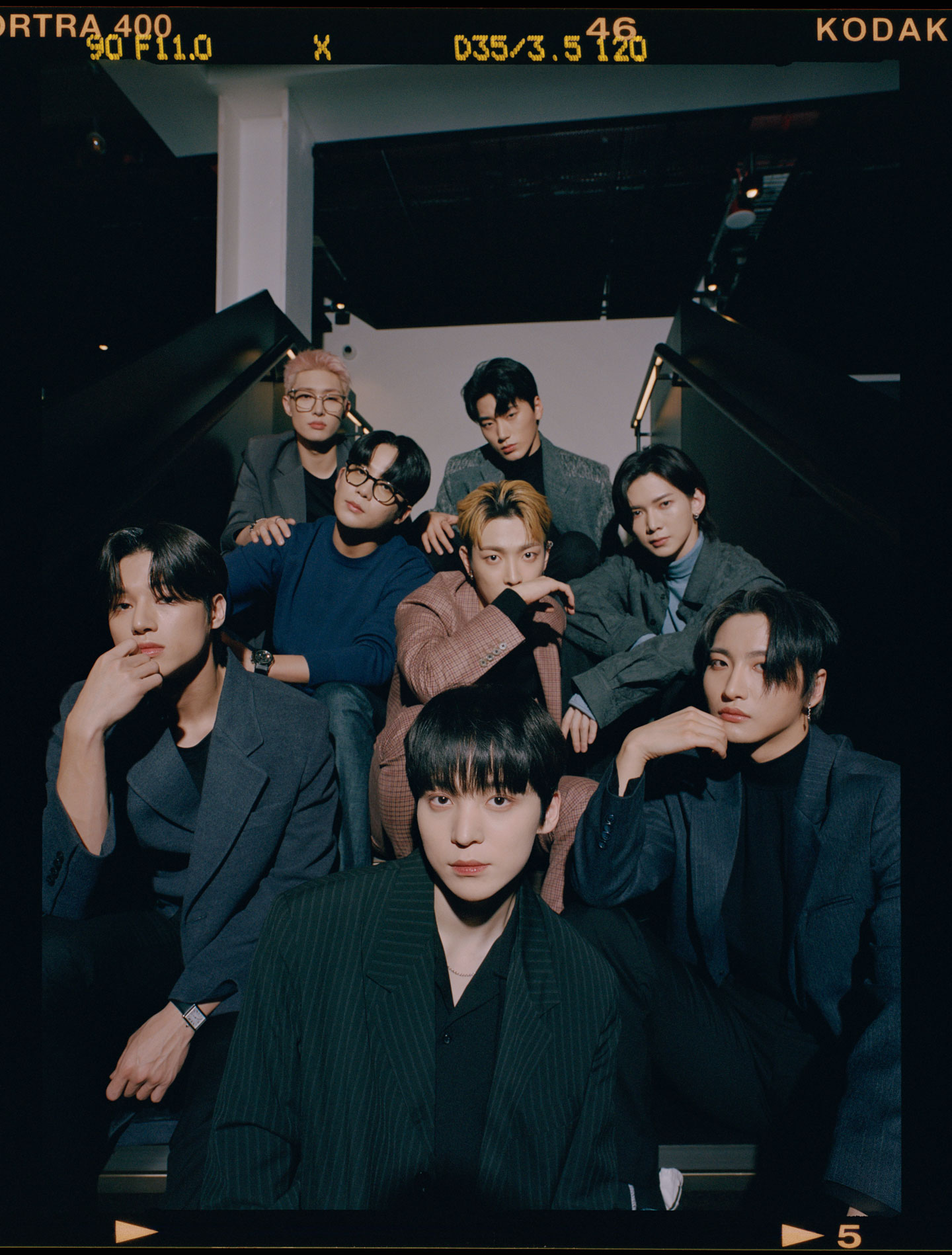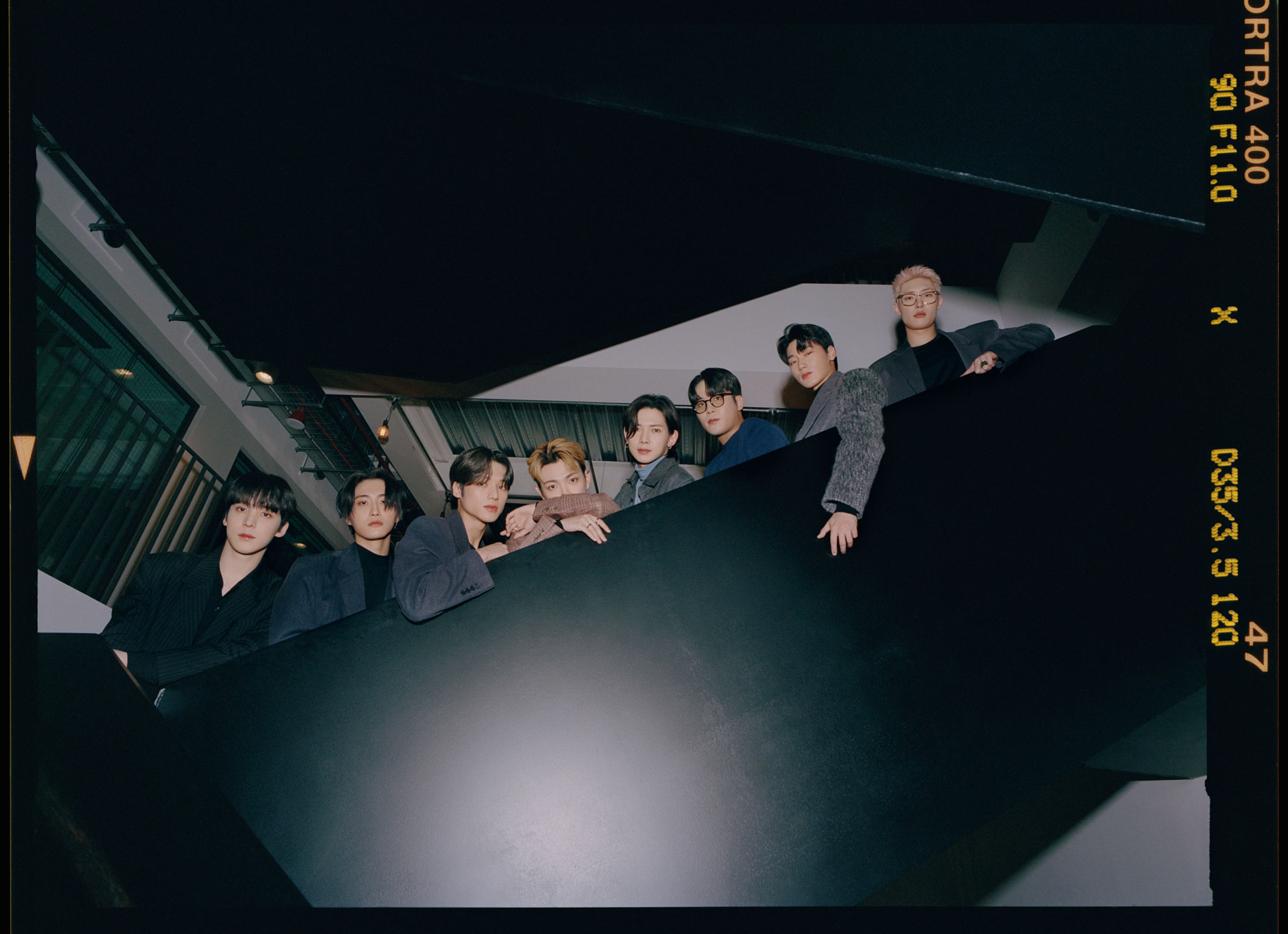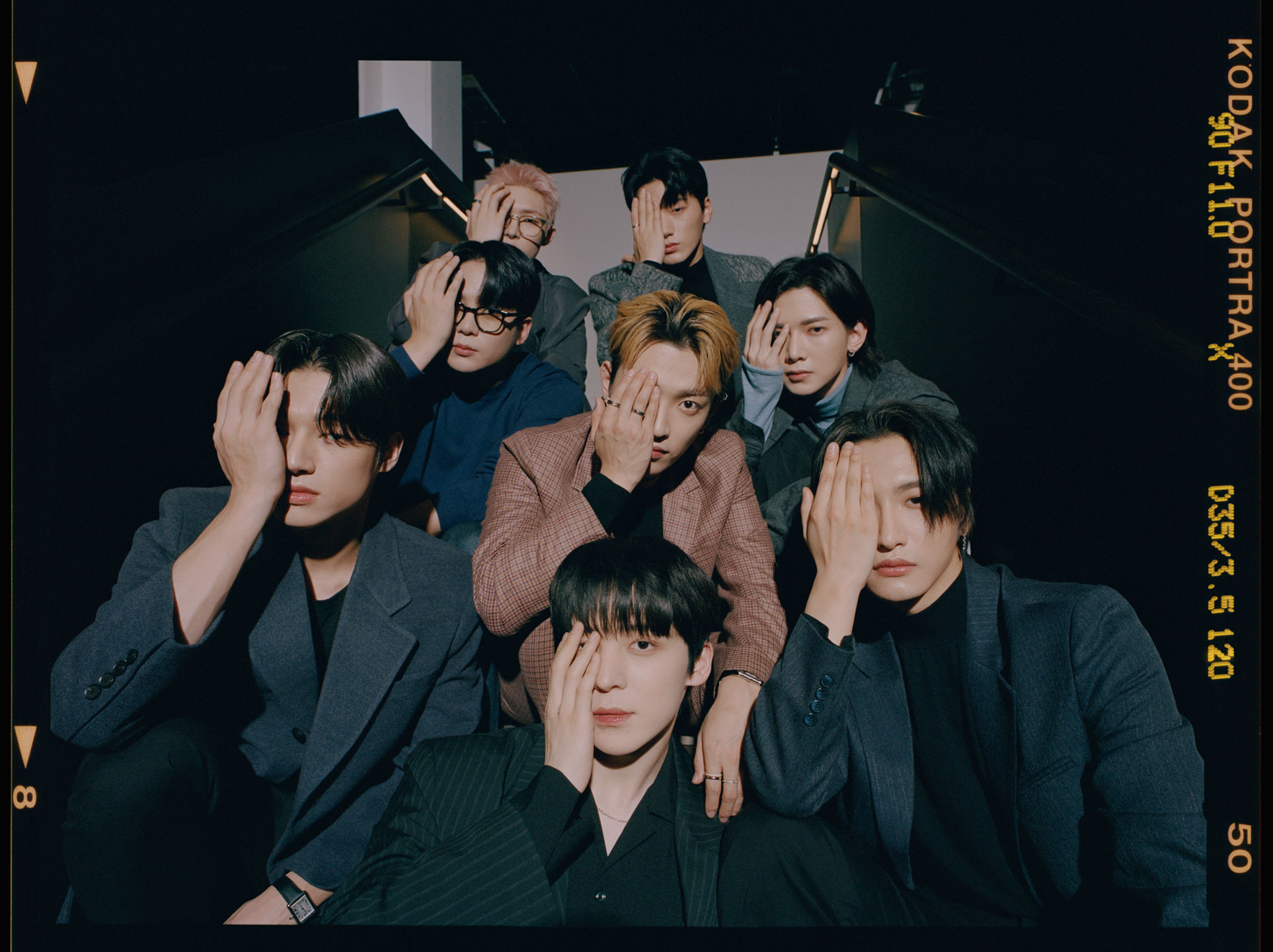ATEEZ have just played a raucous show to 20,000 fans at London’s O2 Arena. Backstage, with the adrenalin still pumping, Hongjoong, Seonghwa, Yeosang, Mingi, San, Wooyoung, Yunho and Jongho are talking about football. Mingi, deep-voiced, his cropped hair cotton candy pink, is a Chelsea fan. Jongho, the band’s youngest at 22, follows Spurs. “Which is better?” asks Mingi. My tentative, uninformed guess (“Spurs?”) yields triumphant hoots and disappointed groans, as Jongho reaches over for a fist bump and hi-five. This exchange isn’t so much about football, as it is a reflection of ATEEZ wanting to make everyone they encounter feel welcome – a habit unchanged despite their stratospheric rise through the global pop landscape since debuting in late 2018.
During their week-long stay, they meet fans (known as ATINY) at a signing event, make late-night TikToks beneath the glow of Big Ben, go live on YouTube from a cosy corner of a hotel room, and watch South Korean forward Son Heungmin score at a Tottenham Hotspur game. The club’s home stadium (soon to host Beyoncé’s five London concerts) leaves a lasting impression on Yeosang: “When I saw how big it was and how loud the people were, I thought about how I want to be an artist that can play there,” he says in his slightly raspy voice. Wooyoung’s thoughts, however, linger Stateside in the wake of their most recent EP, Spin Off: From The Witness, earning them a second Top 10 entry on the Billboard 200 in early January. “I don’t know if it’s a team goal or my own,” he admits, “but I do want a #1 on the Billboard Hot 100. Hoping for it to happen is the easy part, but what’s necessary is the confidence and bravery in the belief that it will happen.”

ATEEZ’ ambitious nature is an overarching constant to their rapid growth as individuals and artists, useful as both a touchstone of their success and a beacon for their creative output. It was present on their first record, Treasure EP1: All To Zero, which set up a rebellious narrative (now a complex and sprawling alt-world storyline) just as much as it drives their meteoric singles and the exploratory genre-overlaps of their B-sides. As a result, they’ve become a prolific and landmark group. The World EP.1: Movement (their ninth EP, out in July 2022) was ATEEZ’ first platinum-selling release, a major accomplishment for an idol group from a relatively small K-pop agency.
Hongjong, the band’s leader, thinks and talks fast (today, in English) but he pauses to take a moment to muse over their trajectory. “Many people say that I can be proud of being a group from a small company that has made their own way. So if we continually do it like this with ATINY, then in the future people might agree that ATEEZ have made a change in K-pop. I think for now though, we haven’t done enough.”
They hope, notes Seonghwa (the band’s eldest member at 24), that their achievements will eventually be on a broader scale. “We’d love to be the people behind that movement,” he says. Hongjoong nods in agreement: “I want for us to provide people with a better understanding of K-pop worldwide. There are people who continue to say that K-pop is so technical and manufactured but K-pop isn’t just a single genre; each group has a different type of art and I want to show how we express our art to everyone. When I look into the crowd at concerts, I can see so many people of all ages and backgrounds yet stereotypes against the artists and the fans still exist.”
In the early days of ATEEZ, it was evident that Hongjoong and Mingi played a key role alongside their music production team, Edenary, and that a sense of individualism seemed to be encouraged in the group’s performances. These are both now acknowledged as strengths in their arsenal. The Fellowship: Break The Wall, their third world tour, serves to highlight their unified stance while showcasing the members’ idiosyncrasies — from dance style to sense of humour — but also how comfortably they inhabit the stage.

“During our 2019 Expedition tour, we learned a lot about how to perform with every show we did,” says Yunho, an effortlessly impressive dancer. “Then during the pandemic, we studied and developed how to really make the performance; working on the stage configuration and synchronisation of moves amongst ourselves. When we came back to Europe and the US last year for the Fellowship: The Beginning of the End tour, we were able to see how everything we’d worked on and our personal growth came together on that stage.”
For some members, the process has involved looking beyond the stage in order to feel more at home on it. Yeosang’s regimented program of working out put him physically and mentally in a stronger place: “I relieve my stress while exercising, but my breathing got better and my muscles also got better, so overall it connected into a great result on stage.” San and Seonghwa also turned inward, sifting through mental libraries of borrowed or imaginary traits to build and inhabit new characters for their performances.
“I always have a lot of imaginative thoughts,” says Seonghwa, whose general serenity is replaced by a lightning-strike energy on stage and sparks of playfulness when you least expect it. “Even before sleeping, I tend to think about fantastical things,” he continues. “I use these to decide on how I’m going to be on stage and make sure the atmosphere matches with elements like my outfit.”
“For San, it’s movies and dramas [that inspire his performances], he takes those characters on,” explains Wooyoung. San, widely lauded for having an explosive stage presence, makes his creative choices the day of. “If there’s something I think of that I want to do that day, I share it with everyone to see if it will be okay. Then we create that image together and I simply express myself.”

Wooyoung, who is both mischievous and magnetic, looks to those he admires for guidance. “I mostly look at videos of our seniors – Jimin (BTS), Taeyang (Big Bang), Hoshi (SEVENTEEN), there’s so many – I get inspiration from them and make it my own on stage.” It’s a process also adopted by Yunho. “There are artists that I can pull from, like Rain, learning from them in order to realise my own style,” Yunho says. “On stage, it’s just me, I’m myself, but I have all this in the back of my mind.”
The title of their current tour, The Fellowship: Break The Wall, is derived from last summer’s single, “Guerrilla”, on which the phrase “break the wall” is chanted with increasing ferocity, culminating in a screamo-style vocal outro. It’s one of the show’s many high points, with ATINY putting their everything into screaming along with the band. The atmosphere grows feverish, the stage bathed in red light as the giant screens flash through the dystopian city of their storyline. It’s unbridled to the point of being transcendental. San grins, reflecting on this moment. “It’s difficult to explain,” he says of the experience, while Hongjoong sees in it the removal of cultural barriers through music. “I see ATINY during ‘Guerrilla’ singing along really loud and really tough,” he says. “They come to our show, they memorise our lyrics, they shout. That’s how they’re breaking the wall, by coming together.”
Since last October, ATEEZ have been playing arenas across Asia, the US and Europe, adding extra nights as they go in order to accommodate the demand, and garnering rave reviews — even from broadsheet media, for whom K-pop remains a confusing phenomenon — in the process. But their feet, heart and heads remain earthbound. “Nothing in this world is guaranteed,” says Wooyoung. “We’re always grateful for everything. It’s something we’ve discussed as a group, but it’s all thanks to ATINY’s love and support that we’re where we are now. To become global artists and a good influence on even more people, we have to hold a sense of responsibility to give our all on stage and deliver our truth. Honestly, it’s less about dreaming of an unknown future and more about how we have to work harder so we can go even higher and pave our own path.”
ATEEZ’ success is holistic in form: personality, performance and music. A harmonious but intriguing balance of authenticity and polish. Their impressive discography features recurring motifs (waves, moon, light) and ideologies (power, truth, rebellion, movement), yet Mingi and Hongjoong — who have written lyrics on every ATEEZ track so far — admit they’re still learning how best to combine what’s on their minds with what’s conducive to furthering their storyline. It is, they agree, not always an easy task.

“It’s absolutely hard to focus on so many themes,” says Hongjoong. “Sometimes my brain stops, so I watch movies or our music videos again. I think too much when I write but, after that work, the lyrics have more power for the fans who know our storyline; they get different emotions and a different effect when I’ve done that work well. It’s really hard but it’s important to do.”
Hongjoong had an epiphany when he picked up a camera while touring last year. “There’s such fierce competition – not just in music but all industries – so if there’s no purpose, I’ve always found it really hard to create freely. We have continuous deadlines. I do the first album, then the second, and once I complete the second album I have to start on the third. I’ve found my hobby with a film camera. I walk around taking photos and I can see that even if I have no immediate purpose, I can create something.” It’s something that’s changed his approach to songwriting. “These days, when I write lyrics or produce a song, I just start from zero,” he explains. “Before, if we had a pirate theme, for example, I would start with that as a topic. That’s why I found it so hard.” He now works backward, getting down exactly what he wants to say before connecting it to the narrative markers. “It’s quite different but it’s more comfortable for me and the results are better than before.”
Hongjoong and Mingi, the group’s rappers, point to last year’s “Halazia” as the hardest storyline track to pen. “The atmosphere of the song is already quite difficult and complex,” Hongjoong notes, looking over to Mingi, who explains his process of cataloguing his many thoughts to later draw from. “I write down a lot of them as memos on my phone, so I always go back to them to see if they match what we’re going through (as a group); that’s how I write my lyrics,” he says. “Sometimes I’ll think of it as writing a script, to really get into that persona.”
Mingi and Hongjoong are not the only collectors and creators in ATEEZ. “In my case,” says Seonghwa, “I always memo whenever I hear a line from a song or a line from a poem that I like, just for me to look back on. I’m the type to jot down my feelings if I experience something special. These help me when I write letters or want to say something to ATINY because I’m able to better word my feelings.” San, meanwhile, cites legendary South Korean poet 나 태주 (Ra Tae-joo) as an influence. “I love poems too — I’ve been writing my own but I keep them to myself,” he says. “They can be about my feelings on a certain day, the weather, objects or characters. I’m able to lay out my feelings like this.”
Now in their fourth year, ATEEZ remain as set on the idea of constantly challenging themselves as they were when they were hungry rookies. Take Jongho for example, whose rich, gut-punching vibrato forms the backbone of many of their songs. When he listened back to The World EP.1: Movement for the first time, he admits that he was “worried because my voice was used in ways that I hadn’t tried before, and I wondered how my vocal colour was going to fit”. He sat down with their producers and worked through “how we could still make it still an ATEEZ song and match my tone, while trying something new. I’ve gained more confidence — it makes me want to do better for all the albums to come.”

Hongjoong laughs. “It means our next albums are, uh, a big thing,” he reveals, knowingly. “There are so many good K-pop and pop stars that if we want to go higher, we have to have more good songs and try other genres, too.” But even as he muses on ATEEZ’ continuing expansion, the idea of one day becoming ‘too big to fail’ doesn’t appeal to him. “No, absolutely not that,” he says, gaze steady. “I want ATINY to be able to tell us if something is bad. I like it when they do this because we don’t want to just give them our popularity. I want to give them good quality, not just a song or a video or a performance.” Does the fact that music is subjective; that no single song can please everybody, bring some comfort? “We try to find the middle ground,” Hongjoong says. “The first thing to note is that if we think it’s really great but someone else says that they think it’s trash, then we don’t really care what they think. But when we’re unsure and questioning and someone says, ‘Yeah, it’s bad’, then ok, we go back to square one.”
The thought of ATEEZ honing their creative output through repeated baptisms of fire might well upset some fans, but the band are not only accustomed to the fame game’s highs and lows but wholly pragmatic in the face of its shadows. So when Wooyoung says he’s aware of “many people” who openly disparage their music, Hongjoong shrugs a little as he responds. “Yeah, there are. We talk about this a lot together, but if there are many more haters than before, it just means we’re more popular than before,” he reasons.
The group finds positive equilibrium via a heartfelt focus on ATINY, and all that comes with being an idol group who are years into a very successful career. “When we look at line-ups now, we’re closing the show,” says Wooyoung. “And as we perform, we see the other artists watching us, and we realise we have more responsibility. Firstly to ATINY, who have been loving us and supporting us from the start, but there’s also a responsibility to spread K-pop and Korean culture because we’re travelling around the world as Korean artists.”
One of ATEEZ many dualities is that while they have big, burning aspirations — Billboard charts, Grammys, performing at the Super Bowl — that make them look at each other starry-eyed, some of their ambitions are precious in a different way: they’re simpler, more immediate. “I’d like to be happier than the day before,” says Mingi. “And I want for us to never change our sincerity toward music and gratitude to our fans,” adds Seonghwa. This is echoed by San, who adds that ultimately, “I’d be satisfied if ATEEZ’ name came up when someone asks who the coolest artist is at the end of the year.”
“I want to make more events with ATINY,” says Hongjoong. “That’s a goal for this year because we always miss them and they always miss us.” Jongho, sitting in the middle of the group, is smiling. He’s been manifesting a more personal ambition. “By next winter I want to be able to snowboard,” he says. “I want to buy my own board, go down the mountain and not fall.”
Credits
Photography Piczo


